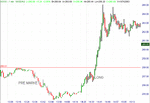LION63,
How can this company be worth more than Disney, News Corp or TimeWarner? Remember the gogo days of the tech stocks? AOL was going to change our lives forever and reach a market capitalisation of $1 trillion, in order to achieve this they merged (bought) Time Warner in the biggest deal of its kind. How much is it worth now? Are revenues rising at anything close to previous predictions? Where is the shareholder value that was going to be created from this mega merger? The only losers were the fools that bought the Utopian dream the investment bankers sold and now they face the ignominy of being hived off from Time Warner as a failed venture even the name has been dropped and all the executives have been put out to pasture.
The GoGo days,..........1927 - 1929, 1962 -1968, 1994 - 1999, ...............................
But some interesting owners;
Mutual Fund Shs Held Shs Chg %Chg $Chg* %Out %Port Rpt Date
Growth Fund Of America, Inc 5,272,100 5,272,100 0.0 976,287,424 1.9 0.0 02-28-05
Fidelity Growth Company Fund 2,782,448 525,000 23.3 97,219,496 1.0 0.0 02-28-05
Legg Mason Value Trust, Inc 2,100,000 2,098,000 104,900.0 404,704,192 0.8 0.0 12-31-04
Fidelity Contrafund 1,317,936 1,317,936 0.0 254,229,840 0.5 0.0 12-31-04
Vanguard Total Stock Market Index Fund 1,044,315 113,878 12.2 21,967,066 0.4 0.0 12-31-04
Fidelity Magellan Fund 848,000 848,000 0.0 163,579,200 0.3 0.0 12-31-04
Vanguard Extended Market Index Fund 681,232 110,774 19.4 21,368,304 0.2 0.0 12-31-04
New Economy Fund 575,000 75,000 15.0 13,888,499 0.2 0.0 02-28-05
Cref Growth Account 565,519 146,131 34.8 28,188,670 0.2 0.0 12-31-04
Amcap Fund, Inc 500,000 -50,000 -9.1 -9,259,000 0.2 0.0 02-28-05
Fidelity Disciplined Equity Fund 463,100 463,100 0.0 88,868,888 0.2 0.0 01-31-05
Prudential Jennison Growth Fund 438,700 236,300 116.7 45,582,268 0.2 0.0 12-31-04
Fidelity Blue Chip Growth Fund 424,800 0 0.0 0 0.2 0.0 01-31-05
Variable Insurance Products Contrafund Portfolio 383,343 383,343 0.0 73,946,864 0.1 0.0 12-31-04
Alliance Premier Growth Fund, Inc 327,000 327,000 0.0 62,751,300 0.1 0.0 01-31-05
Institution Name Shs Held Shs Chg %Chg $Chg* %Out %Port Rpt Date
Capital Research & Management Co 13,452,299 8,031,599 148.0 1,383,217,792 4.8 0.6 03-31-05
Fidelity Management & Research Co 11,956,967 3,424,040 40.0 513,289,120 4.3 0.4 03-31-05
Alliance Capital Management 6,420,024 3,684,610 135.0 631,518,080 2.3 0.5 03-31-05
Jennison Associates 5,196,777 1,096,525 27.0 147,582,640 1.9 2.1 03-31-05
Goldman Sachs Asset Management 4,840,409 2,763,538 133.0 473,342,272 1.7 0.6 03-31-05
Legg Mason Fund Advisors 4,830,227 87,883 2.0 -42,372,224 1.7 1.9 03-31-05
Barclays Global Investors Intl 3,786,822 2,516,599 198.0 438,672,960 1.4 0.1 03-31-05
Sands Capital Management 3,346,185 3,346,185 100.0 604,019,840 1.2 4.9 03-31-05
Rcm Capital Management 2,597,898 1,439,330 124.0 245,586,240 0.9 2.5 03-31-05
Wellington Management 2,432,614 2,253,634 1,259.0 404,605,600 0.9 0.2 03-31-05
Lone Pine Capital Llc 2,409,033 1,806,577 300.0 318,707,040 0.9 6.0 03-31-05
Morgan Stanley Investment Management 2,348,739 2,069,118 740.0 370,062,752 0.8 0.4 03-31-05
Sequoia Capital 2,185,537 2,185,537 100.0 394,511,296 0.8 100.0 03-31-05
Vanguard Group 1,996,598 48,545 2.0 -15,159,233 0.7 0.1 03-31-05
T Rowe Price Associates 1,704,272 822,102 93.0 137,564,576 0.6 0.2 03-31-05
T.Rowe Price & Sequoia are, or were once upon a time "Value" investors. I wonder if the original managers are still there? ( Michael Price, & Bill Ruane )
And the 5% or greater owners;
Holder Name Shs Held $ Market Value %Out Fully Diluted Shs Rpt Date
Page ( Larry ) 37,710,784 7,270,261,760 13.6 37,710,784 12-31-04
Brin ( Sergey ) 37,607,436 7,250,337,280 13.5 37,607,436 12-31-04
Moritz, Michael 23,893,800 2,587,937,536 8.6 23,893,800 08-20-04
Doerr, L. John 21,043,712 2,279,244,288 7.6 21,043,712 08-20-04
Sequoia Capital 16,747,926 3,228,832,768 6.0 16,747,926 12-31-04
Schmidt, Eric 14,389,635 1,558,541,312 5.2 14,389,635 08-20-04
cheers d998

